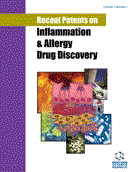Abstract
Current TB regimen involves a combination of first and second line drugs which target only a small number of core metabolic processes such as deoxyribonucleic acid (DNA)/ ribonucleic acid (RNA) synthesis, cell wall synthesis, and energy metabolism pathways. New classes of drugs with additional drug targets that are resistant to mutation are an urgent necessity. Novel targets involved in vital aspects of bacterial growth, metabolism and viability and whose inactivation would lead to bacterial death or an inability to persist need to be investigated. Isocitrate lyase (ICL), which catalyses the first step in the glyoxylate cycle is found to play a pivotal role in persistence of Mycobacterium tuberculosis in mice, can be a potential target for anti-tubercular drug. The current review provides a detailed overview of the therapeutic potential, patents and recent advancements in the investigative studies done on isocitrate lyase (ICL) as an antitubercular drug target. Salicylanilide, benzanilide, 3-nitropropionamide and pthalazinyl derivatives, Pyruvate-isoniazid analogs and its copper complexes are among the synthesized compounds showing a great potential to inhibit mycobacterial ICL and a significant antimycobacterial effect. Some of the relevant patents in the ICL research have been further reviewed and discussed.
Keywords: Isocitrate lyase, Mycobacterium tuberculosis, inhibition, persistence.
Recent Patents on Inflammation & Allergy Drug Discovery
Title:Isocitrate Lyase: A Potential Target for Anti-Tubercular Drugs
Volume: 7 Issue: 2
Author(s): Rohit Sharma, Oisik Das, Satyawan G. Damle and Anil K. Sharma
Affiliation:
Keywords: Isocitrate lyase, Mycobacterium tuberculosis, inhibition, persistence.
Abstract: Current TB regimen involves a combination of first and second line drugs which target only a small number of core metabolic processes such as deoxyribonucleic acid (DNA)/ ribonucleic acid (RNA) synthesis, cell wall synthesis, and energy metabolism pathways. New classes of drugs with additional drug targets that are resistant to mutation are an urgent necessity. Novel targets involved in vital aspects of bacterial growth, metabolism and viability and whose inactivation would lead to bacterial death or an inability to persist need to be investigated. Isocitrate lyase (ICL), which catalyses the first step in the glyoxylate cycle is found to play a pivotal role in persistence of Mycobacterium tuberculosis in mice, can be a potential target for anti-tubercular drug. The current review provides a detailed overview of the therapeutic potential, patents and recent advancements in the investigative studies done on isocitrate lyase (ICL) as an antitubercular drug target. Salicylanilide, benzanilide, 3-nitropropionamide and pthalazinyl derivatives, Pyruvate-isoniazid analogs and its copper complexes are among the synthesized compounds showing a great potential to inhibit mycobacterial ICL and a significant antimycobacterial effect. Some of the relevant patents in the ICL research have been further reviewed and discussed.
Export Options
About this article
Cite this article as:
Sharma Rohit, Das Oisik, Damle Satyawan G. and Sharma Anil K., Isocitrate Lyase: A Potential Target for Anti-Tubercular Drugs, Recent Patents on Inflammation & Allergy Drug Discovery 2013; 7 (2) . https://dx.doi.org/10.2174/1872213X11307020003
| DOI https://dx.doi.org/10.2174/1872213X11307020003 |
Print ISSN 1872-213X |
| Publisher Name Bentham Science Publisher |
Online ISSN 2212-2710 |
 40
40Related Articles
-
Editorial: Molecular Scenarios Behind Infectious Diseases
Current Medicinal Chemistry Potential Inhibitor of Adenylyl Sulfate Reductase Isolated from Desulfovibrio desulfuricans with PU/PU-Ag to Control Pitting Corrosion of Oil Tanks and Pipelines
Current Enzyme Inhibition Mycobacterium tuberculosis and Dendritic Cells: Whos Manipulating Whom?
Current Immunology Reviews (Discontinued) TLC Bioautography on Screening of Bioactive Natural Products: An Update Review
Current Analytical Chemistry A Comprehensive View on Metabolic Pathway Analysis Methodologies
Current Bioinformatics Preface
Current Drug Targets Interrelated Roles for the Aryl Hydrocarbon Receptor and Hypoxia Inducible Factor-1α in the Immune Response to Infection
Current Immunology Reviews (Discontinued) Targeting Protozoan Parasite Metabolism: Glycolytic Enzymes in the Therapeutic Crosshairs
Current Medicinal Chemistry Spontaneous Pneumothorax
Current Respiratory Medicine Reviews Non-Antidepressant Treatment of Social Anxiety Disorder: A Review
Current Clinical Pharmacology Signal Transduction of the Aging Innate Immune System
Current Immunology Reviews (Discontinued) RepurposeVS: A Drug Repurposing-Focused Computational Method for Accurate Drug-Target Signature Predictions
Combinatorial Chemistry & High Throughput Screening Immunological Aspects of Adult T-Cell Leukemia/Lymphoma (ATLL), a Possible Neoplasm of Regulatory T-Cells
Current Immunology Reviews (Discontinued) Recent Advances of Fluorescent Technologies for Drug Discovery and Development
Current Pharmaceutical Design A New Era of Pulmonary Delivery of Nano-antimicrobial Therapeutics to Treat Chronic Pulmonary Infections
Current Pharmaceutical Design A Review of the Biological Activities of Heterocyclic Compounds Comprising Oxadiazole Moieties
Current Topics in Medicinal Chemistry Vitamin D and Sepsis: From Associations to Causal Connections
Inflammation & Allergy - Drug Targets (Discontinued) Role of Ultraviolet (UV) Disinfection in Infection Control and Environmental Cleaning.
Infectious Disorders - Drug Targets Editorial [Hot Topic:Protein targets for development of drugs against Mycobacterium tuberculosis (Guest Editor: Walter Filgueira de Azevedo)]
Current Medicinal Chemistry Toll-Like Receptors in Skin Infections and Inflammatory Diseases
Infectious Disorders - Drug Targets



















